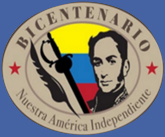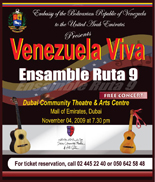
Bolivarian Republic of Venezuela
Embassy in the UAE
The New PowerThe Citizen Power The Citizens Power is constituted by the Ombudsman, The General Prosecutor, and the Comptroller General of the Republic, and its functions are "to prevent, investigate into and sanction the acts that offend public ethics and administrative morals; to monitor the good management and legality of the use of public heritage; the fulfillment and application of the principle of legality in all the administrative activities of the State (...)" Their duties are: • To prevent, investigate and sanction all acts which infringe upon public
ethics and • To ensure the prudent and legal management of the public resources, as
well as the compliance • To promote education as a vehicle forward for the citizens, as well as solidarity,
liberty, The responsibilities of the Ombudsman are: • To protect human rights • To ensure the correct functioning of public services • To prevent unconstitutional acts, to impose habeas corpus, to ensure the right to
proper legal • To urge the General Prosecutor to act against civil servants who have violated human rights • To protect the rights of the indigenous people • To promote and disseminate policies on human rights, etc. The duties of the General Prosecutor and Public Ministries are: • To guarantee the rights and constitutional guarantees of the judicial processes • To ensure the efficient functioning of the justice administration • To direct penal investigation • To carry out penal action, etc. The attributes of the Office of the Comptroller General: • To exercise fiscal control • To control public debt • To carry out administrative investigations • To urge the Public Prosecutor to initiate judicial procedures as a result of damages
caused to • To exercise control of the administrative process. The National Electoral Power The National Electoral Council (CNE) as its ruling organ, and the National Electoral Committee, The Commission of Civil and Electoral Registry and the Commission of Political Participation and Financing as its subordinate organs exercise the Electoral Power. Similarly, the directors of the CNE will not be allowed to have connections with organizations of political orientation. Out of a total of five, three of these directors will be proposed by civil society, another one by the faculties of Law and Political Science of the nation's universities, and the fifth one by the Citizens Power. As an innovation, its functions include organizing elections in trade unions, professional associations and political parties. The duties of the electoral power, amongst other, as determined by law, are as follows: • To establish electoral laws, resolve any doubts and difficulties which might arise • To formulate the budget, which the CNE negotiates directly with the National
Assembly and • To issue directives concerning electoral financing and political broadcasting and to
apply • To declare the complete and/or partial nullity of elections • The organization, administration, control and supervision of all aspects of elections
to public • To organize elections to trades union, professional corporation and political
organizations, as • To organize electoral processes of grass root organizations, if requested by them to
do or asked • To maintain, organize, direct and supervise the civil and voters´ registers • To organize the inscription and register of all political organizations and to check
that these • To study all requests of establishing, renewing and dissolving of all political
organizations, to • To control, regulate and investigate the financing funds of all political organizations. The electoral power organizations ensure the equality, trustworthiness, impartiality, transparency and efficiency of the electoral processes, as well as the application of universal suffrage and proportional representation. |








